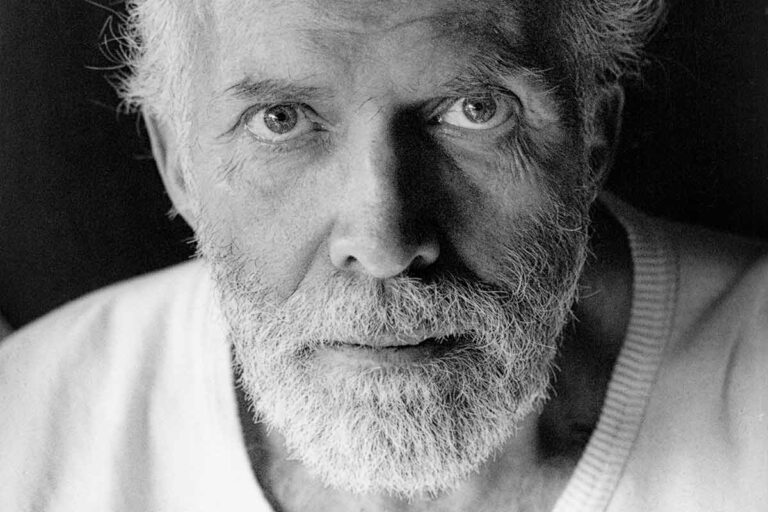Om Shanti Shanti Om.
Good morning everyone, I welcome you from the bottom of my heart. One of the things people ask me often, and I know people have doubts about, is how to tell whether a teacher is real. How do I know if a teacher is realised? I can’t know it myself; to be able to know whether someone is free, I would have to see them in person in front of me. But there are a number of things that can indicate who is not a real teacher: certain attitudes, things they do, things they say. I had to deal with quite a lot of deceit in my own search, so I learned how it goes, and I want to share that experience with all of you.
How can I recognize who is and who is not a real teacher? What is the easiest and most common way to tell? There is a simple way to eliminate most false teachers, and it’s just this: the teacher should speak with his own voice, and not hide behind other teachers. A real teacher never interprets what other teacher have said, or discuss what other teachers have said. He doesn’t create controversies, he doesn’t start group discussions about other teachers. You can easily see how someone who does these things cannot be free, they surely have a big spiritual ego, they love having admirers, being seen, and having people believe that they are a teacher. When someone has the real experience of freedom, a real liberating experience, this experience just cannot compare with any other experience you may have read about, or someone may have told you about, or explained to you, from any other teacher whatsoever. So if someone is doing these things, it means they don’t have the experience themselves. When you have the experience of being free, you want to share your own experience, not some other teacher’s, because yours is the only one that’s actually real in your personal experience. It’s the only real thing for you. Of course you respect other teachers, but you don’t hide behind them. A true teacher will not do that. Robert Adams wasn’t reading Ramana’s texts or discussing about Ramana or interpreting what Ramana had said. He would just mention him from time to time, or he would sometimes read something because it made sense in the context of what he was sharing in that particular Satsang.
So when you see someone who tries to explain to you what this or that teacher really meant, run. Run away, because this person will hurt you. Learn your lesson and look for someone else — someone who is for real.
Another thing that has become very common, is that there are a number of modern approaches which use the words “advaita” and “non-duality” in their jargon. They do this to give themselves some credibility, but if you look carefully, their approaches are the complete opposite of what advaita has been doing and transmitting for over 5,000 years. They are not non-duality, they are not advaita. These approaches promise you that, if you apply this technique, if you enrroll in that course, you will get something, you will achieve abundance, health, or you will reach your goals in life. But for that you need to apply their technique or complete their course. In advaita, in non-duality, the most basic principle is that you are not the doer. So if any apparent teacher tells you that by applying this technique or following that course you will obtain some result or other, they are lying to you. Run away, learn your lesson, and look for someone who is for real. People come to these teachers and follow these courses because they would love for these promises to be true, they would love it if things worked this way, but they don’t. It’s all a lie.
If you want to have arguments, if you want to judge things and waste your time, you are free to do so. But since you asked me how can you tell whether a teacher is for real or not, well, this is how. Just by checking these two things you have eliminated 90% of false teachers.
If you have doubts whether a given teacher is real or not, you have to go meet him or her, you have to put yourself in their presence. A video will not be enough, and neither will an online Satsang. You have to put yourself in front of that person. Check whether you feel a great sense of peace when you are in their presence, without the person doing anything on their part, just when they enter the room. This happens with all true teachers. When Robert Adams used to enter the room, I immediately felt that he had come. My eyes were closed, I didn’t hear him come in, but I knew he had just walked in because peace took hold of me. At some point I had so much practice that I could feel when he was coming in the car, driving up to the house where we used to have Satsang. I could feel he was coming near. That is the presence of the teacher, and only real teachers have it.
Another thing you can do is ask directly, put yourself in front of the person, look him or her in the eye, and ask, are you free? Look them in the eye. The only good answer to this question is “yes”. If you see that there is some doubt, or if the answer starts with “Well… you know there are different levels of freedom, there are different levels of teachers…” or anything like that, you know they are lying. Run away, far away. Learn your lesson and look for one who is for real.
There is yet another thing that happens quite often, and this one is really laughable. There are so-called teachers who want to come to my Satsang. Why would you do that? If you are really free, why do you want to attend my Satsang? Satsang is for seekers. We always find them trying to sneak in, and I tell them: don’t you say you are free? Give your own Satsang, share your experience! Why do you want to come to my Satsang? What they really want is to have a picture with me, to show it on their Facebook page, so it looks like we’re friends, so that I give them credibility. As far as I can, I will not allow this, because no true teacher needs to, wants to, or tries to go to another teacher’s Satsang. We respect each other, and when we meet another teacher we greet each other affectionately or maybe have a drink together, but we don’t go to another teacher’s Satsangs.
There’s another thing that’s very much in fashion these days, they call it Mindfulness. Some people say it’s advaita, but Mindfulness is not advaita, it’s not non-duality. Mindfulness amounts to taking a small piece of the advaita teachings and trying to make a whole package with it, but using the mind. They try to force the mind to live in the present, and with a lot of effort, they momentarily succeed. But the moment you involve the mind, it’s not advaita, and it’s not non-duality. Because the moment you get tired stop trying to make the mind stay in the present moment, the mind will once again do what it always does. It will send you back into the past, and forward into the future, because there is no way you can live in the present moment through your mind. The present moment cannot be thought, it can only be lived. But Mindfulness is big these days, and they use the word “advaita” to give themselves some credibility. Don’t fall for this, they’re after your money, you’re being swindled and it’s not going to work. Sure, you do it and you feel a little better. You made an effort, you forced the mind to stay in the present moment for a while, and living in the present makes you feel complete and gives you some peace. But then, as soon as you stop doing the effort, it goes away. It’s just like going to see a psychologist. You tell them your problems, you cry a bit, you blow your nose and feel a little better, but two days later you’re back the way you were and you’re making an appointment for another session, so you can blow your nose again and tell them all your problems and be told “oh poor thing”. These are not advaita teachers, these touchy feelies who ask you to tell them your problem, oh dear, poor you, how are you feeling? Would you like to let it go? These are soppy people, not teachers of non-duality. An advaita teacher is tough when they need to be tough. They are tough because they tell the truth. Many people used to come to Robert with their problems, and Robert would cut them and tell them “it will pass” and see them out. An advaita teacher needs to be tough sometimes. With some people you need to show understanding, but with others you need to be hard, like a father. A father cannot be always like “my poor child, I will buy you this, I will take you to see a movie”. To be a good father, sometimes they need to punish the child, be harsh sometimes. And an advaita teacher needs to be tough when it’s needed. Many people say “Luis is so tough, he’s not very loving”. Of course! Sometimes I’m tough, I’m not touchy feely. If you need me to be tough with you, with all the love in the world, I will be tough, like a good father. I’m not going to do like this (makes a caressing motion) with your ego, I’m here to destroy it. That is my work, that is the work of a real teacher.
Luis de Santiago
Satsang in A Coruña, 4th October 2020

